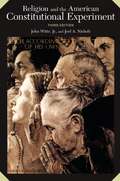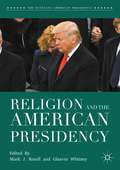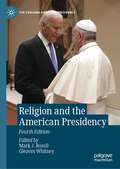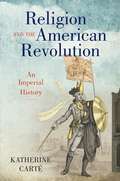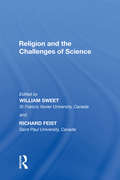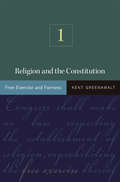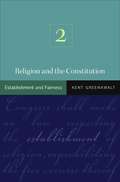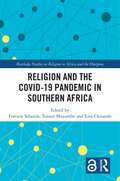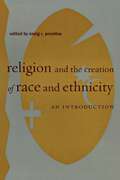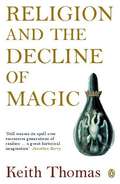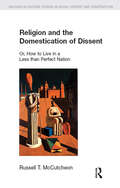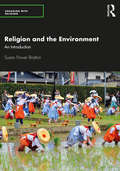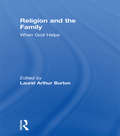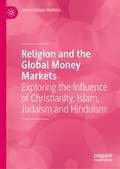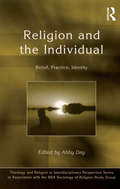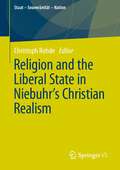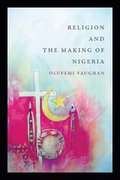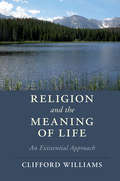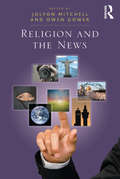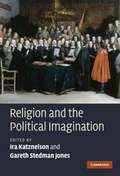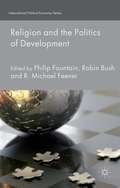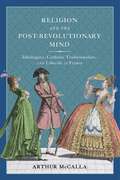- Table View
- List View
Religion and the American Constitutional Experiment
by Joel A. Nichols John Witte Jr.The third edition of this classic book provides a comprehensive, multidisciplinary overview of the history, theory, law, and comparative analysis of American religious liberty from the earliest colonial period through the most recent Supreme Court cases. The authors present balanced, accessible discussions of controversial issues, such as funding religious schools and charities and displaying religious symbols on government property. Three chapters new to this edition cover the free exercise of religion, religion and public life, and religious organizations and the law. In addition, an expanded concluding chapter places the American experience in global context by comparing contemporary American religious liberty law with international human rights standards.
Religion and the American Constitutional Experiment
by Joel A. Nichols John Witte Jr.This updated edition of Religion and the American Constitutional Experiment provides a comprehensive, multidisciplinary overview of the history, theory, law, and comparative analysis of American religious liberty from the earliest colonial period through the most recent Supreme Court cases. In accessible, jargon-free language, the authors present balanced discussions of controversial issues, including the funding of religious schools and charities and displaying religious symbols on government property. Three chapters new to this edition cover the free exercise of religion, religion and public life, and religious organizations and the law. In addition, the authors address seven new cases, and an expanded concluding chapter places the American experience in a global context by comparing contemporary American religious liberty law with international human rights standards.
Religion and the American Constitutional Experiment (3rd Edition)
by Joel A. Nichols John Witte Jr.This volume offers a novel reading of the American constitutional experiment in religious liberty. The First Amendment, John Witte argues, is a synthesis of both the theological convictions and the political calculations of the eighteenth-century American founders. The founders incorporated six interdependent principles into the First Amendment-liberty of conscience, freedom of exercise, equality of faiths, plurality of confessions, disestablishment of religion, and separation of church and state. Both the nuance and the balance of these six principles have often been lost on current interpreters of the First Amendment. Particularly the Supreme Court has tended to reduce the First Amendment to mechanical tests and metaphorical formulae that often replace, rather than guide, its analysis and application of these principles. First Amendment doctrine today has thus become notoriously confused, casuistic, and self-contradictory. Religion and the American Constitutional Experiment urges a return to the principled approach to religious rights, evident both in the American founding era and in the modern international human rights movement. Witte uses these principles to analyze the free exercise and establishment case law of the last two centuries. He then illustrates the virtues of his principled approach through analysis of the thorny contests over tax exemptions for religions, the role of religion in the public school, among others. This lucid and engaging volume serves both as a provocative primer for students and a pristine restatement for specialists in law, religion, history, politics, and American studies. Through a fresh reading of the sources and cases, and through the discovery and introduction of several new materials, the author reclaims the essential value, vigor, and vitality of our most cherished religious rights and liberties.
Religion and the American Presidency
by Mark J. Rozell Gleaves WhitneyThis volume opens a new avenue toward understanding the politics and policies of many US presidents. As the essays in this book reveal, religion has had an enormous impact on many critical presidencies in US history. Contrary to the conventional wisdom, these essays reveal the deeply religious side to Truman, Eisenhower, and Reagan, among others.
Religion and the American Presidency (The Evolving American Presidency)
by Mark J. Rozell Gleaves WhitneyThis book chronologically analyzes fourteen key US Presidents, from Washington to Biden, to highlight how religion has informed or influenced their politics and policies. For years, leading scholars have largely neglected religion in presidential studies. Yet, religion has played a significant role in a number of critical presidencies in US history. This volume reveals the deep religious side to such presidents as Truman, Eisenhower, and Reagan, among others, and the impact that faith had on their administrations. Now in its fourth edition, this work includes analysis of Joe Biden as the second Catholic president in United States history and provides a timely update to a key text in the study of religion and the presidency.
Religion and the American Revolution: An Imperial History
by Katherine CartéFor most of the eighteenth century, British protestantism was driven neither by the primacy of denominations nor by fundamental discord between them. Instead, it thrived as part of a complex transatlantic system that bound religious institutions to imperial politics. As Katherine Carte argues, British imperial protestantism proved remarkably effective in advancing both the interests of empire and the cause of religion until the war for American independence disrupted it. That Revolution forced a reassessment of the role of religion in public life on both sides of the Atlantic. Religious communities struggled to reorganize within and across new national borders. Religious leaders recalibrated their relationships to government. If these shifts were more pronounced in the United States than in Britain, the loss of a shared system nonetheless mattered to both nations. Sweeping and explicitly transatlantic, this book demonstrates that if religion helped set the terms through which Anglo-Americans encountered the imperial crisis and the violence of war, it likewise set the terms through which both nations could imagine the possibilities of a new world.
Religion and the Challenges of Science
by William Sweet Richard FeistDoes science pose a challenge to religion and religious belief? This question has been a matter of long-standing debate - and it continues to concern not only scholars in philosophy, theology, and the sciences, but also those involved in public educational policy. This volume provides background to the current 'science and religion' debate, yet focuses as well on themes where recent discussion of the relation between science and religion has been particularly concentrated. The first theme deals with the history of the interrelation of science and religion. The second and third themes deal with the implications of recent work in cosmology, biology and so-called intelligent design for religion and religious belief. The fourth theme is concerned with 'conceptual issues' underlying, or implied, in the current debates, such as: Are scientific naturalism and religion compatible? Are science and religion bodies of knowledge or practices or both? Do religion and science offer conflicting truth claims? By illuminating contemporary discussion in the science-religion debate and by outlining the options available in describing the relation between the two, this volume will be of interest to scholars and to members of the educated public alike.
Religion and the Constitution, Volume 1: Free Exercise and Fairness
by Kent GreenawaltBalancing respect for religious conviction and the values of liberal democracy is a daunting challenge for judges and lawmakers, particularly when religious groups seek exemption from laws that govern others. Should members of religious sects be able to use peyote in worship? Should pacifists be forced to take part in military service when there is a draft, and should this depend on whether they are religious? How can the law address the refusal of parents to provide medical care to their children--or the refusal of doctors to perform abortions? Religion and the Constitution presents a new framework for addressing these and other controversial questions that involve competing demands of fairness, liberty, and constitutional validity. In the first of two major volumes on the intersection of constitutional and religious issues in the United States, Kent Greenawalt focuses on one of the Constitution's main clauses concerning religion: the Free Exercise Clause. Beginning with a brief account of the clause's origin and a short history of the Supreme Court's leading decisions about freedom of religion, he devotes a chapter to each of the main controversies encountered by judges and lawmakers. Sensitive to each case's context in judging whether special treatment of religious claims is justified, Greenawalt argues that the state's treatment of religion cannot be reduced to a single formula. Calling throughout for religion to be taken more seriously as a force for meaning in people's lives, Religion and the Constitution aims to accommodate the maximum expression of religious conviction that is consistent with a commitment to fairness and the public welfare.
Religion and the Constitution, Volume 2: Establishment and Fairness
by Kent GreenawaltBalancing respect for religious conviction and the values of liberal democracy is a daunting challenge for judges and lawmakers, particularly when religious groups seek exemption from laws that govern others. Should students in public schools be allowed to organize devotional Bible readings and prayers on school property? Does reciting "under God" in the Pledge of Allegiance establish a preferred religion? What does the Constitution have to say about displays of religious symbols and messages on public property? Religion and the Constitution presents a new framework for addressing these and other controversial questions that involve competing demands of fairness, liberty, and constitutional validity. In this second of two major volumes on the intersection of constitutional and religious issues in the United States, Kent Greenawalt focuses on the Constitution's Establishment Clause, which forbids government from favoring one religion over another, or religion over secularism. The author begins with a history of the clause, its underlying principles, and the Supreme Court's main decisions on establishment, and proceeds to consider specific controversies. Taking a contextual approach, Greenawalt argues that the state's treatment of religion cannot be reduced to a single formula. Calling throughout for acknowledgment of the way religion gives meaning to people's lives, Religion and the Constitution aims to accommodate the maximum expression of religious conviction that is consistent with a commitment to fairness and the public welfare.
Religion and the COVID-19 Pandemic in Southern Africa (Routledge Studies on Religion in Africa and the Diaspora)
by Fortune Sibanda, Tenson Muyambo and Ezra ChitandoThis book investigates the role of religion in the context of the COVID-19 pandemic in Southern Africa. Building on a diverse range of methodologies and disciplinary approaches, the book reflects on how religion, politics and health have interfaced in Southern African contexts, when faced with the sudden public health emergency caused by the pandemic. Religious actors have played a key role on the frontline throughout the pandemic, sometimes posing roadblocks to public health messaging, but more often deploying their resources to help provide effective and timely responses. Drawing on case studies from African indigenous knowledge systems, Islam, Rastafari and various forms of Christianity, this book provides important reflections on the role of religion in crisis response. This book will be of interest to researchers across the fields of African Studies, Health, Politics and Religious Studies. The Open Access version of this book, available at http://www.taylorfrancis.com, has been made available under a Creative Commons Attribution-Non Commercial-No Derivatives 4.0 license.
Religion and the Creation of Race and Ethnicity: An Introduction (Religion, Race, and Ethnicity #2)
by Craig R. PrentissThe first collection to distinguish religion's role in the creation of race and ethnic categoriesReligion and the Creation of Race and Ethnicity is the first collection devoted to demonstrating the role that religion and myth have played in the creation of the categories of “race” and “ethnicity.” When scholars approach religion and race, they tend to focus on such issues as how African Americans have expressed Christianity, or how Japanese or Mexicans have lived “religiously.” This volume, meant specifically for those new to the field, brings together an ensemble of prominent scholars and illuminates instead the role religious myths have played in shaping those very social boundaries that we call “races” and “ethnicities.” It asks, what part did Christianity play in creating “Blackness”? To what extent was Japanese or Mexican identity itself the product of religious life?The text, comprised of all original material, introduces readers to the social construction of race and ethnicity and the ways in which these concepts are shaped by religious narratives. It offers examples from both the U.S. and around the world, exploring these themes in the context of places as diverse as Bosnia, India, Japan, Mexico, Zimbabwe, and the Middle East. The volume helps make the case that any account of the social construction of race and ethnicity will be incomplete if it fails to consider the influence of religious traditions and myths. Contributors include: Eddie S. Glaude, Jr., Joel Martin, Jacob Neusner, Roberto S. Goizueta, Laurie Patton, and Michael A. Sells.
Religion and the Decline of Magic: Studies in Popular Beliefs in Sixteenth and Seventeenth-Century England
by Sir Keith ThomasWitchcraft, astrology, divination and every kind of popular magic flourished in England during the sixteenth and seventeenth centuries, from the belief that a blessed amulet could prevent the assaults of the Devil to the use of the same charms to recover stolen goods. At the same time the Protestant Reformation attempted to take the magic out of religion, and scientists were developing new explanations of the universe. Keith Thomas's classic analysis of beliefs held on every level of English society begins with the collapse of the medieval Church and ends with the changing intellectual atmosphere around 1700, when science and rationalism began to challenge the older systems of belief.
Religion and the Domestication of Dissent: Or, How to Live in a Less Than Perfect Nation (Religion in Culture)
by Russell T. McCutcheonSince the events of 9/11 the representation of Islam has increasingly come adrift from its actuality. Scholars and pundits have effectively demonised a whole faith by wilfully apportioning blame and by ignoring the differences within the Islamic movement. 'Religion and the Domestication of Dissent' examines how the classifications we use to name and negotiate our social worlds - notably 'religion' - are implicitly political. The study ranges widely from contemporary film and art to the War on Terror and will be invaluable to readers interested in the politics behind the portrayal of dissenting religious groups.
Religion and the Environment: An Introduction (Engaging with Religion)
by Susan Power BrattonHow does religion relate to our global environment? Religion and the Environment provides a comprehensive and accessible introduction to this controversial question by covering the following important themes: the religion-environment interface pre- and post-industrial religious practices related to resource extraction and the rise of the Anthropocene an analysis of religious response to the impacts of contemporary industrialization, globalization, and urbanization religious thought, leadership, policy formation, and grassroots activism relative to the environment. Religion and the Environment will offer students and general readers a sophisticated yet accessible exploration of the relationship between religion and the environment, through case studies ranging from climate change to the impacts of warfare. This engaging book will be an excellent addition to introductory courses and those approaching the topic for the first time.
Religion and the Family: When God Helps
by William M Clements Laurel A BurtonThis fascinating book guides family therapists in recognizing the importance of their clients’spirituality or religion to therapy. Experienced therapists demonstrate how to incorporate patients’spiritual beliefs in successful family therapy. Religion and the Family explains how the spirituality of individuals and families can be used as a valuable resource for understanding and healing family problems. Therapists will learn to utilize a couple’s or family’s particular god-construct as a fundamental part of the treatment system.Through a balanced combination of theory and clinical data, this comprehensive book gives family therapy practitioners and graduate-level students insight into the role of spirituality in therapy. Beginning with a brief historical overview of the relationship between religion and therapy, the book emphasizes the three areas of theory, clinical applications, and research. Family therapists will find important topics applicable to their practice, such as a model for the use of religion in therapy, a model for taking a spiritual genogram, observations about interfaith marriages, and a theory of therapy as spirituality. Graduate-level students, therapists in training, and therapists needing an introduction to religion in therapy will find this a valuable guide for incorporating spiritual and religious factors into treatment systems.
Religion and the Global Money Markets: Exploring the Influence of Christianity, Islam, Judaism and Hinduism
by James Simon WatkinsThis book focuses on how religion—particularly Christianity, Islam, Judaism, and, to a lesser extent, Hinduism—is shaping the ethos and daily actions of market participants within the global money markets. The concepts inherent within Christianity, Islam, Judaism, and Hinduism are making themselves felt within the global money markets. As Islamic finance led to the introduction of sharia compliant derivatives, for example, Christian investment funds are leading ethical initiatives on Wall Street, the City of London, and elsewhere such as divesting from fossil fuels in response to the climate change emergency. Jewish faith led funds are making significant strides with the further development of impact investments. The concept of Hindu economics is also beginning to shape the actions of some market participants which are tied to the ideals of Mahatma Gandhi.
Religion and the Individual: Belief, Practice, Identity (Theology and Religion in Interdisciplinary Perspective Series in Association with the BSA Sociology of Religion Study Group)
by Abby DayWhat does religion mean to the individual? How are people religious and what do their beliefs, practices and identities mean to them? The individual's place within studies of religion has tended to be overlooked recently in favour of macro analyses. Religion and the Individual draws together authors from around the world to explore belief, practice and identity. Using original case studies and other work firmly placed in the empirical, contributors discuss what religious belief means to the individual. They examine how people embody what religion means to them through practice, considering the different meanings that people attach to religion and the social expressions of their personal understandings and the ways in which religion shapes how people see themselves in relation to others. This work is cross-cultural, with contributions from Asia, Europe and North America.
Religion and the Liberal State in Niebuhr's Christian Realism (Staat – Souveränität – Nation)
by Christoph RohdeThis book intends to analyze Reinhold Niebuhr's understanding of the state in his Christian Realism. Although his overall notion was thoroughly analyzed in different disciplines and respects, this specific focus can be diagnosed as a lacuna. The task of this book is to develop a hypothesis in terms of under what political, social, organizational or intellectual context Niebuhr made use of what definition of the state. When did he support the extension of state power (e. g. in war times, during economic crisis) and when did he criticize tendencies toward autocratic structures inside Western style democracies?
Religion and the Making of Modern East Asia
by Thomas David DuboisReligious ideas and actors have shaped Asian cultural practices for millennia and have played a decisive role in charting the course of its history. In this engaging and informative book, Thomas David DuBois sets out to explain how religion has influenced the political, social, and economic transformation of Asia from the fourteenth century to the present. Crossing a broad terrain from Tokyo to Tibet, the book highlights long-term trends and key moments, such as the expulsion of Catholic missionaries from Japan, or the Taiping Rebellion in China, when religion dramatically transformed the political fate of a nation. Contemporary chapters reflect on the wartime deification of the Japanese emperor, Marxism as religion, the persecution of the Dalai Lama, and the fate of Asian religion in a globalized world.
Religion and the Making of Nigeria
by Olufemi VaughanIn Religion and the Making of Nigeria, Olufemi Vaughan examines how Christian, Muslim, and indigenous religious structures have provided the essential social and ideological frameworks for the construction of contemporary Nigeria. Using a wealth of archival sources and extensive Africanist scholarship, Vaughan traces Nigeria's social, religious, and political history from the early nineteenth century to the present. During the nineteenth century, the historic Sokoto Jihad in today's northern Nigeria and the Christian missionary movement in what is now southwestern Nigeria provided the frameworks for ethno-religious divisions in colonial society. Following Nigeria's independence from Britain in 1960, Christian-Muslim tensions became manifest in regional and religious conflicts over the expansion of sharia, in fierce competition among political elites for state power, and in the rise of Boko Haram. These tensions are not simply conflicts over religious beliefs, ethnicity, and regionalism; they represent structural imbalances founded on the religious divisions forged under colonial rule.
Religion and the Meaning of Life: An Existential Approach (Cambridge Studies in Religion, Philosophy, and Society)
by Clifford WilliamsAs humans, we want to live meaningfully, yet we are often driven by impulse. In Religion and the Meaning of Life, Williams investigates this paradox – one with profound implications. Delving into felt realities pertinent to meaning, such as boredom, trauma, suicide, denial of death, and indifference, Williams describes ways to acquire meaning and potential obstacles to its acquisition. This book is unique in its willingness to transcend a more secular stance and explore how one's belief in God may be relevant to life's meaning. Religion and the Meaning of Life's interdisciplinary approach makes it useful to philosophers, religious studies scholars, psychologists, students, and general readers alike. The insights from this book have profound real-world applications – they can transform how readers search for meaning and, consequently, how readers see and exist in the world.
Religion and the News
by Owen GowerIn Religion and the News journalists and religious leaders reflect on their interactions with one another and their experiences of creating news. Through a series of original contributions, leading practitioners shed light on how religious stories emerge into the public domain. Experienced journalists and religious representatives from different faith traditions critically consider their role in a rapidly evolving communicative environment. Aimed at journalists, faith representatives, religious leaders, academics and students this book offers a timely exploration of the current state of religious news coverage and makes an original contribution to the emerging media, religion and culture literature, as well as to media and communication studies. Religion and the News presents insights from leading journalists and religious leaders, many well-known figures, writing openly about their experiences. Contributors include: Jolyon Mitchell, Director of the Centre for Theology and Public Issues Edinburgh University; Christopher Landau, Religious Affairs Correspondent, BBC World Service; Andrew Brown, The Guardian; Professor Lord Harries of Pentregarth, former Bishop of Oxford; Dr Indarjit Singh, Director of the Network of Sikh Organisations; Rabbi Dr Jonathan Romain, Director, Jewish Information and Media Service; Imam Monawar Hussain, Muslim Tutor, Eton College; Charlie Beckett, Director, Polis; Ruth Gledhill, Religion Correspondent, The Times; Catherine Pepinster, Editor, The Tablet; Riazat Butt, Religious Affairs Correspondent, The Guardian; Professor the Worshipful Mark Hill QC, Barrister and Fellow, Centre for Law and Religion, Cardiff University.
Religion and the Political Imagination
by Ira Katznelson Gareth Stedman JonesThe theory of secularisation became a virtually unchallenged truth of twentieth-century social science. First sketched out by Enlightenment philosophers, then transformed into an irreversible global process by nineteenth-century thinkers, the theory was given substance by the precipitate drop in religious practice across Western Europe in the 1960s. However, the re-emergence of acute conflicts at the interface between religion and politics has confounded such assumptions. It is clear that these ideas must be rethought. Yet, as this distinguished, international team of scholars reveal, not everything contained in the idea of secularisation was false. Analyses of developments since 1500 reveal a wide spectrum of historical processes: partial secularisation in some spheres has been accompanied by sacralisation in others. Utilising new approaches derived from history, philosophy, politics and anthropology, the essays collected in Religion and the Political Imagination offer new ways of thinking about the urgency of religious issues in the contemporary world.
Religion and the Politics of Development
by Philip Fountain Robin Bush R. Michael FeenerEschewing tired doctrines of strict demarcation between development, religion and politics, this volume takes up the task of critically analysing this triple nexus. The chapters brought together in this landmark collection draw on detailed empirical studies from around contemporary Asia. Through their engagements with Islam, Christianity, Buddhism, and secularism, among other traditions, the chapters argue persuasively for a new research agenda that attends to the ways in which development,religion, and politics are dynamically interconnected. In doing so, they deploy innovative conceptual approaches that rework taken-for-granted frames.
Religion and the Post-revolutionary Mind: Idéologues, Catholic Traditionalists, and Liberals in France (McGill-Queen's Studies in the History of Ideas)
by Arthur McCallaThe French Revolution swept away the Old Regime along with many of its ideas about epistemology, history, society, and politics. In the intellectual ferment that followed, debates about religion figured prominently as diverse thinkers grappled with the philosophical and civil status of religion in a post-revolutionary age. Arthur McCalla demonstrates the central place of religion in the intellectual life of post-revolutionary France in Religion and the Post-revolutionary Mind. Certain questions – What is the nature of religion? Does society rest on religious foundations? What ought to be the place of religion in society? – drew sustained attention from across the political spectrum. Idéologues viewed religion as error and sought to eradicate it through the promotion of secular values. Catholic Traditionalists understood religion as a body of revealed truths of supernatural origin that ought to be authoritative in all aspects of life. Liberals sought to replace Christian orthodoxy with a new public faith consonant with liberal values. But these blocs were not monolithic, and McCalla reveals the complexities of each one, as well as the dialogues and rivalries among them. The categories established by the concepts of religion these thinkers constructed continue to shape debates over liberationist critiques, liberal pluralism, laïcité, and political theology. The place of religion in civil society is again a matter of urgent debate. Religion and the Post-revolutionary Mind provides essential historical context for thinking about the status of religion in the contemporary world.
